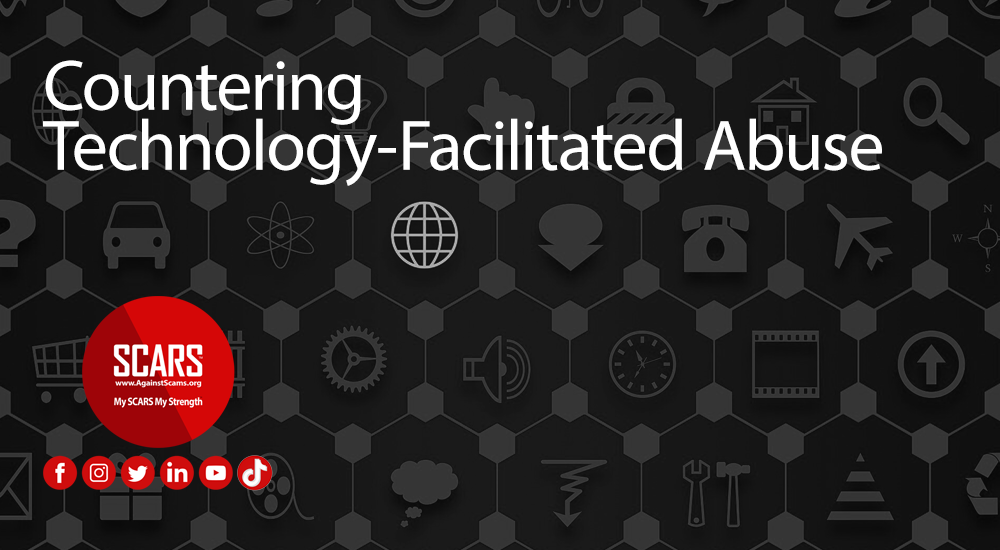Countering Technology-Facilitated Abuse
Criminal Justice Strategies for Combating Nonconsensual Pornography, Sextortion, Doxing, and Swatting
A RAND® Corporation Research Report
Technology-Facilitated Abuse (TFA)
by Amanda R. Witwer, Lynn Langton, Michael J. D. Vermeer, Duren Banks, Dulani Woods, Brian A. Jackson
INTRODUCTION:
The proliferation of websites, social media platforms, and applications that enable users to interact virtually and often anonymously has given rise to new modes and methods of perpetrating harassment, abuse, and other criminal behaviors that compromise victims’ privacy and safety. These types of acts, termed technology-facilitated abuse (TFA), can involve the use or distribution of the victim’s personal information, which compromises the victim’s privacy and poses a threat to their safety. Efforts to combat these profoundly harmful acts are limited by a lack of awareness among the general public and criminal justice practitioners, impediments to investigation and adjudication presented by digital spaces, and laws and policies that have not kept pace with advancements in digital technologies. To examine this issue, RTI International and the RAND Corporation convened an expert workshop. The participants discussed the challenges, opportunities, and complexities faced by law enforcement and criminal justice practitioners in TFA cases. Using these discussions, the panel members identified and ranked needs for the public, law enforcement, and criminal justice practitioners to successfully identify and prosecute TFA cases. This report provides the prioritized list of needs and accompanying context from the discussion that resulted from this effort.
KEY FINDINGS
Raising awareness about the prevalence, costs, and harms of TFA is critical
- Participants suggested developing a conceptual framework of TFA behaviors and providing school-based public education around internet safety. Participants determined that legislation, measurements of the harms and costs of TFA behaviors, and prioritization by leadership are key to ensuring that TFA cases are prioritized by law enforcement and courts.
Approaches to investigating TFA cases should acknowledge the harm done to victims
- Increased coordination among law enforcement, lawyers, victims’ rights organizations, and service providers would encourage TFA victims to come forward with their cases and would empower them to make decisions about what path of recourse to take.
Criminal justice practitioners often lack the tools to address TFA cases effectively
- Standards and training around the identification, collection, and processing of digital evidence would enable law enforcement to conduct thorough investigations of Technology-Facilitated Abuse (TFA) crimes. Instituting statutes specific to TFA behaviors, accompanied by sentencing guidelines that acknowledge the harms to and vulnerabilities of TFA victims, would allow prosecutors to ensure that TFA sentences are commensurate with harm and that victims’ needs are met.
Participants reported the critical importance of efforts to mitigate the significant, irreparable, and persistent harm experienced by Technology-Facilitated Abuse (TFA) victims
- There is a need for research to evaluate the extent to which existing remedies mitigate harm, tools for the early detection of TFA, and methods for mitigating the effects of TFA and empowering victims.
Deterrence must be at the core of efforts to address TFA
- Statutes that criminalize Technology-Facilitated Abuse (TFA) behaviors might serve as a deterrent for some types of TFA perpetrators, although research is needed to better understand TFA perpetrators and the effectiveness of deterrence approaches.
RECOMMENDATIONS
- Research the cost of doxing and the costs of emergency responses to swatting and associated risks to society.
- Develop basic primary education for kids and parents about consent and the risks and consequences of sharing information online.
- Conduct a survey about Technology-Facilitated Abuse (TFA) to collect data on victim response, effects on victims, and secondary injuries or personal harm.
- Develop a conceptual framework or taxonomy for definitions of TFA so that criminal justice practitioners can recognize it and respond.
- Identify approaches to incentivize law enforcement and prosecutors to prioritize TFA cases.
- Develop training materials for law enforcement about TFA, the impact on victims, and the associated statutes.
- Conduct research to understand the characteristics of perpetrators and what deterrents might be effective.
- Require basic training around digital evidence among first responders.
- Disseminate existing training regarding digital evidence and develop accreditation standards.
- Conduct training on interviewing techniques for delicate or traumatic situations.
- Establish TFA investigative teams or units.
- Designate specific resources for TFA so that TFA investigations do not take resources away from other areas.
- Conduct research and gather data to evaluate the harm of TFA and the effectiveness of remedies.
- Develop methods and resources to mitigate the effects of TFA and support and empower victims.
- Promote coordination about what the victim wants, their fears, and their experience among law enforcement, crisis providers, and lawyers.
THE FULL RAND REPORT
You may download your own copy of the report for personal, non-commercial use only – making it easier to read offline. Reproduction online is prohibited.
RESOURCES
- Technology-Facilitated Abuse (vawnet.org)
- What is technology-facilitated abuse? | eSafety Commissioner
- Technology-Facilitated Abuse – Safe Steps Family Violence Response Centre
TAGS: SCARS, RAND Corporation Report, Cybercrime Research, Technology-Facilitated Abuse (TFA), digital evidence, Online Abuse, Sextortion, Doxing, Information About Scams, Anti-Scam, Scams, Scammers, Fraudsters, Cybercrime, Crybercriminals, Romance Scams, Scam Victims, Online Fraud, Online Crime Is Real Crime, Scam Avoidance
SCARS™ Team
Society of Citizens Against Relationship Scams Inc.
A Worldwide Crime Victims Assistance Nonprofit Organization
Visit: www.AgainstScams.org
Contact Us: Contact@AgainstScams.org
PLEASE SHARE OUR ARTICLES WITH YOUR FRIENDS & FAMILY
HELP OTHERS STAY SAFE ONLINE – YOUR KNOWLEDGE CAN MAKE THE DIFFERENCE!











Leave A Comment